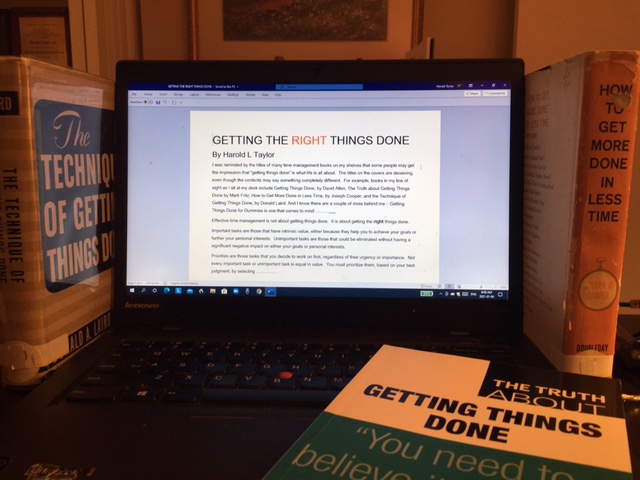I was reminded by the titles of many time management books on my shelves that some people may get the impression that “getting things done” is what life is all about. The titles on the covers are deceiving, even though the contents may say something completely different. For example, books in my line of sight as I sit at my desk include Getting Things Done, by David Allen; The Truth about Getting Things Done by Mark Fritz; How to Get More Done in Less Time, by Joseph Cooper; and the Technique of Getting Things Done, by Donald Laird.
Effective time management is not about getting things done. It is about getting the right things done.
Important tasks are those that have intrinsic value, either because they help you to achieve your goals or further your personal interests. Unimportant tasks are those that could be eliminated without having a significant negative impact on either your goals or personal interests.
Priorities are those tasks that you decide to work on first, regardless of their urgency or importance. Not every important task or unimportant task is equal in value. You must prioritize them, based on your best judgment, by selecting those that you will do first, and scheduling enough time in your planner to work on them.
Urgency comes into play only if tasks seem to be of equal importance. When that occurs, you must choose the one that is the most urgent. Urgent tasks are those that would lose some or all their importance if not completed by a certain time (deadline.)
Prioritizing is the key to effectiveness since unimportant tasks can be urgent as well. The most frequent error in prioritizing occurs when relatively unimportant tasks are selected because of their urgency. If in doubt, ask yourself the question, “What would be the impact on my goals or my success (personal interests), if I did not complete this task by its deadline? If the answer is little or none, it is not a priority for you.
Efficiency is getting more things done in a certain amount of time. Effectiveness is getting the right things done in a similar amount of time. Both are important. But we should never get more things done at the expense of the important things.
Prioritizing your work is essential. If you fill your day with unimportant tasks, or other people’s tasks, whether urgent or not, there will be no time left for the things that really matter.
When you prioritize, take into consideration that both “importance and urgency vary with the situation,” as explained in my blog by that title posted two weeks ago. Be reminded also that effective time management requires skill in sizing up a situation and selecting from among alternatives to maximize results with a minimum expenditure of time. And that following through with the right selections requires self-discipline.
Next week I will discuss the tendency of people to take the path of least resistance by working on an easy task first, and why it is not the right thing to do.

